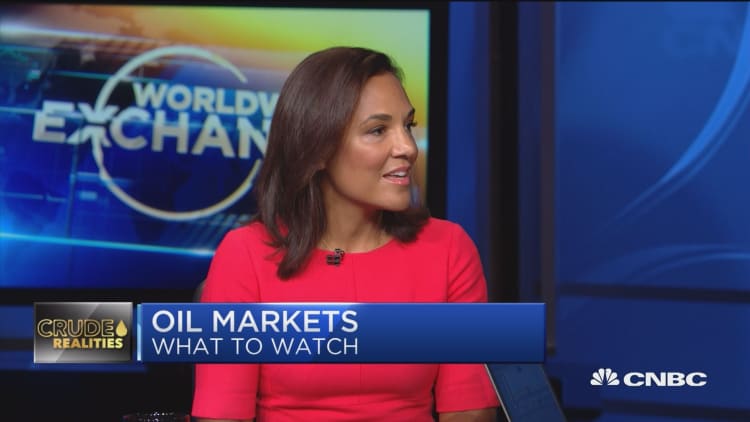Iraq's oil-rich Basra province is being rocked by renewed violence as summer protests regain momentum, threatening oil facilities and the country's leadership.
Thousands of Iraqis have been taking to the streets daily over the last week, torching government buildings and political party offices in a show of anger against abject living conditions, government corruption and foreign influence.
The past week saw rockets fired at the U.S. consulate and Basra airport. The Iranian consulate and offices of powerful Iranian-backed Shia paramilitary groups were also set alight.
So far, at least 12 protesters have been killed and more than 200 injured by security forces, deployed against the demonstrators for the first time this year in a sign of mounting panic from the government.
As home to most of the oil production facilities for OPEC's second-largest producer, Basra in crisis could have a material impact on oil output and prices, analysts say.
It may also see Iraq's Prime Minister Haider al-Abadi pushed from power, creating even more uncertainty for the war-scarred nation and its 15-year old democracy.
"We've seen protests around facilities and threats being made against oil companies. Some companies have taken their foreign workers out," Helima Croft, global head of commodity strategy at RBC Capital Markets, told CNBC.
"Production hasn't been hit yet, but if you were to have one facility go down, you could lose upwards of 700,000 to 800,000 barrels of production, so it's a big story to watch."
Sitting on oil wealth, but steeped in poverty
The protests, which began in July, kicked off again last week following a raft of hospitalizations due to contaminated drinking water. In August alone, 17,000 Basra residents were sent to the hospital with colic, diarrhea and symptoms of cholera, according to Basra's director-general of public health.
Southern Iraq, despite sitting on 80 percent of the country's oil wealth and being home to its only deepwater port, Um Qasr, has long been a site of severe poverty and discontent. Instead of reaping the benefits of its natural resources, which include 70 percent of Iraq's proven natural gas reserves, Basra suffers high unemployment, frequent electricity shortages, unsafe water and waste facilities and crumbling infrastructure.
Demonstrations during southern Iraq's sweltering summer months have therefore become something of a ritual in recent years, as residents lament decrepit public services and rampant corruption amid daytime temperatures of more than 120 degrees Fahrenheit.

But this year's unrest comes at a particularly vulnerable time for the country, just a few months after its May 12 election failed to produce a clear winner and less than a year after the end of its long and bloody battle against the Islamic State. A record low 44 percent voter turnout in the election and the subsequent unrest have revealed the extent to which ordinary Iraqis are fed up with government elites and have lost faith in the political process.
Political leadership at risk
After contested results and a controversial vote recount, parties and politicians are still far from forming a government, let alone one that could address Iraqis' demands for better services.
Incumbent Prime Minister Al-Abadi, a favorite of Washington, was expected to retain his post while forming an alliance with the leading Sairoon alliance, led by populist Shia cleric Moqtada al Sadr. Sadr, a fierce anti-corruption campaigner, was the only leader whose party's office was not targeted by the protests.
In July, Abadi pledged billions in funding for Basra's failed infrastructure. Months later, however, nothing has changed, prompting calls for the prime minister to step down.
The government inaction, aggressive security response and increased violence has led Iraq's Shiite spiritual leader, the highly influential Ali al-Sistani, to publicly oppose all mainstream politicians who have held power in recent years from involvement in Iraq's government formation.
This effectively vetoes Abadi and other mainstream candidates from remaining at the helm of power, and solidifies the likelihood that Abadi will be ousted, according to political risk firm Eurasia Group.
A 'material impact' on oil prices
Meanwhile, oil facilities and exports will continue to be at risk as protests show no sign of abating, according to an Eurasia Group analyst.
"Over the next few days, the risk of protesters targeting oil facilities in the Basra province is sharply increasing," wrote Ayham Kamel, practice head for Eurasia Group's Middle East and North Africa practice, in a client note this week.
On September 5, protesters threatened to shut down access to production facilities at Basra's West Qurna 1 oil field, which produce about 450,000 barrels per day (bpd), and shut down access to Um Qasr port. They also attempted to shut down facilities at the West Qurna 2 field that account for roughly 71,000 bpd of the field's 375,000 bpd of production, Eurasia reported.
Iraq, the world's 12th largest oil producer, has an output of 4.4 million bpd and hit a near-record high in production in August, according to the International Energy Agency.
But against the backdrop of a tightening oil market where major producers Venezuela and Iran are being constricted due to economic crisis and sanctions, any further disturbance to production could be meaningful for markets.
"The problem with the market right now is we don't have a lot of shock absorbers," Croft said. "So we really do have a problem where if we have one more country experience a supply outage, this market will be very tight and prices will go materially higher."


